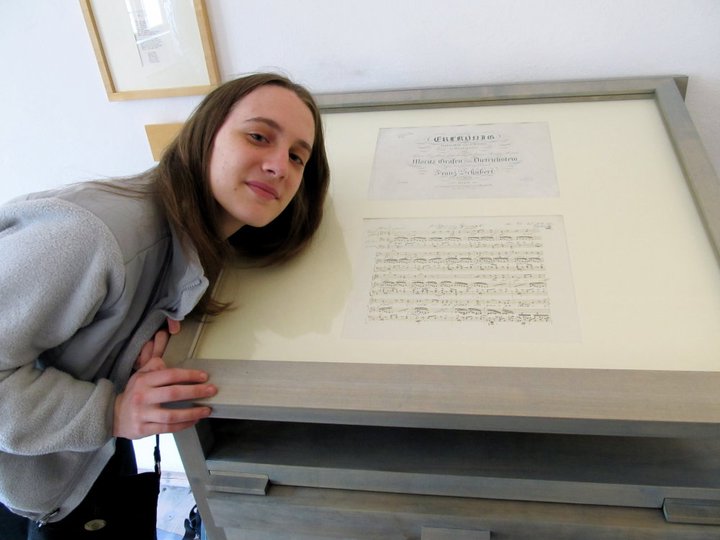
Schubert Shrine




|
The way to listen to music is to decide you want to listen to music. To decide to be open to what it wants to say. There are Audible Signs everywhere...lolllllll |
|
2 1. Browsed my playlist until a title jumps out to me. 2. Looked up the poem on Lieder.Net, but NOT the translation. 3. Attempted a literal translation to translate it myself, using leo for the unknown words. (I was listening to the song at this point too, but more idly) 4. Listened to the song intentionally while checking out my translation. To see if it makes sense with the music. 5. Checked Liedernet's translation and made final adjustments. The song is "Hier umarmen sich getreue Gatten" (Schiller) (D. 60) and it's one stanza. I like my rough translation quite a lot and I share it here. ***AHEM*** "Hier umarmen sich getreue Gatten" (Schiller) (D. 60) Hier umarmen sich getreue Gatten, Küssen sich auf grünen sammt'nen Matten Liebgekost vom Balsamwest, Ihre Krone findet hier die Liebe, Sicher vor des Todes strengem Hiebe, Feiert sich ein ewig Hochzeitfest. Here true consorts embrace each other, They kiss each other on the smooth green meadow Love-fondled by the Balsam Zephyrs, Here love finds her crown, Safe before Death's strong hacks, They celebrate an eternal wedding fest. *** I'm going for literal, unadorned, and retaining as much fragrance of German as I can without being confusing. Also I'm very much a student so I'm also doing this as kind of an educational exercise. "Liebgekost" is a poetic word and not in the dict.leo dictionary. And the only possibilities it suggests for "gekost" and its root "kosen" is "fondle/fondled." So that's what I wrote sorry lol "Lovingly embraces" is probably the most accurate translation but I...just don't like it. I'm not happy with fondled but at least it's both accurate and kind of funny :D Fine for a student translation, yes? Anyway, I have the feeling this is a very lushly romantic line in German :) My German tutor talked to me about how so much of Schubert's poetic choices are nauseatingly corny, and of course we don't sense this as easily in acquired languages :D Although I guess one's senses get acclimated over time. I didn't really find this line interesting before noticing that, and now I kind of wonder how Schubert sets it. Will he notice the lushness musically? "Matte" is mostly words related to "mat." Dict.Leo didn't offer "lawn" or anything. I love the juicy super-clear example of the genitive in the strengem Hiebe line. Oh and Balsamwest! I hope that's right. Dict.Leo didn't have anything. My educated guess was a kind of incense but that didn't make any sense :). (inny-sense... okay) I saw another translation that said something like "west winds of the Balsamic region" or something. I was really happy to use "Zephyr" because it's our super cool English word for "west wind," straight to us from ancient Greece. And it's also definitely very high-poetic and old-fashioned, so it even fits with the sub-mood sort of. *** Ok! This is a stanza in a much longer poem, which turns out to be (drumroll) Elysium! Elysium is the ancient Greek form of heaven. So what is the big question with this setting? Having listened to the song in advance, I know the correct answer, but I think you can get it from looking at the poem. Let's go through it together. hearts.png kisses.png Here embrace true lovers, All snuggly on the meadowhearts.png kisses.png kisses.png hearts.png Lovingly caressed by the west Balsam winds, Love finds her crown hearts.png kisses.png Safe before :[ Death's Strong Hacks :[ scythe.PNGbats_flying_away_01.gif Blood.JPG smileyface.png They celebrate an eternal wedding fest. Rings Kisses Turtledoves Lmaoooo I will do better with that with the demonstrative formatting but I'm typing every single [b] tag so leave me alone Okay. I made my point. The line about death is starkly different from the rest. Does Schubert know that? YES. Do I already know Schubert knew that because I listened before I had finished with the poem? YES Whoops and I'll do it again. Okay, I'm off to make notes. Ttys!!! |
|
|
|
But before you do, or after, whatever, ask yourself: If you were a composer, how would you set this line? I don't want the specifics. How would you feel about the lovers' security from the slashes of death, because they had already been through it? What kind of emotion would you want to portray? Maybe you would want to assure your listeners that it's part of the beautiful, natural cycle of things - you would want to give it lush, beautiful context so they know the darkness is just part of the light. So maybe you'd flow into that, emphasize it. Warm it... stretch out "sicher" to embrace the listener like a warm hug. That's just a possibility. Am I lying? Maybe Schubert did that... after all, people do talk about his revolutionary approach to writing about death, and wasn't the Erl King friendly, after all? Yeah. I bet you can write about the lush, warm, welcoming line in your analysis papers :D |
|
5 There are lots of ways to adore Schubert. One of them is fiddling around on this website with HTML and stuff. I wouldn't have expected that, but it's the way the adoration finds form in my life. I want to write this out because I want to spend some time devoted to Schubert each day. Not because of a sense of duty, finally, after all these years of trying to dissolve my sense of duty... but instead because when I lie in bed feeling fulfilled or not fulfilled, the difference is 1:1 whether I've spent some time that day adoring Schubert. I'm not sure if it's Schubert himself, the fact that I'm not monetizing or hustling Schubert and this HTML, or both things. All of my passions are monetized at this point. I feel truly relaxed very rarely because I don't have clearly defined work/life boundaries. There are a lot of complicating factors that make it really challenging for me to set such bondaries. But I think the most effective thing to do is to ... do stuff. If possible :) Not just wait for the conditions to be right. Like if you enjoy having a ritual of cleaning off your desk, if it makes the experience of sitting at the computer to type more pleasant and allows you to be more present, then it's cool to clean off your desk before you type. It's a ritual. It's an act of adoration. But if it's the new moon and you're on your p*riod and you're really sleepy and groggy and fumbling throughout the day like a ghost, and you haven't got the spoons to move around anything on the desk, and the dishes are piling up and there's just random stuff all over the floor, then the best thing to do is probably: probably what? Probably what, emtida? What should you do if your house is about to drown you and you haven't thought about Schubert yet today? Obviously do the dishes. Just kidding! Do like all those male geniuses do and let the kitchen accrue some fucking flies. We aren't here for long. I need to water the garden of my heart. It's very important. Watering the garden of your heart also helps you have the energy to deal with life's demands. It gives you a reason. I think, if things are going great (ideal) for me and my energy flow, then my desk is clean when I drop in to write... and when I cleaned my desk I was thinking of that future moment... and that thinking of the future moment gets fulfilled when I drop in to write... but ultimately, when I have that urge to sit and write, I should do it regardless of what the desk looks like, just accepting some of the unpleasance and discomfort. The preparation should not *have to* be part of the same IMPULSE as actually sitting down and writing. Anyway... I want to move stuff around here... but I think I actually have to nap now lol okay all right I just want to say that yesterday I checked out the Elysium poem. Schubert set a bunch of the other stanzas all in 1813 while he was in school. And then a few years later set the whole poem for voice and piano. Interesting findings!!! To me. Okay, naptime. Goodnigt |
|
6 The settings for this poem listed by Lieder.net:D 51: Stanza 3, "Unendliche Freude durchwallet das Herz" (1813), published 1897 (vocal trio for 2 tenors and bass) D 53: Stanza 1, "Vorüber die stöhnende Klage" (1813), published 1892 (vocal trio for 2 tenors and bass) D 54: Stanza 3, "Unendliche Freude durchwallet das Herz" (1813), published 1873 (vocal trio for 3 male voices) (canon) D 57: Stanza 4, "Hier strecket der wallende Pilger" (1813), published 1897 (vocal trio for 2 tenors and bass) D 58: Stanza 5, "Dessen Fahne Donnerstürme wallte" (1813), published 1892 (vocal trio for 2 tenors and bass) D 60: Stanza 6, "Hier umarmen sich getreue Gatten", D 60 (1813), published 1892 (vocal trio for 2 tenors and bass) D 584: Whole text, "Elysium" (1817), published 1830 (voice and piano) |